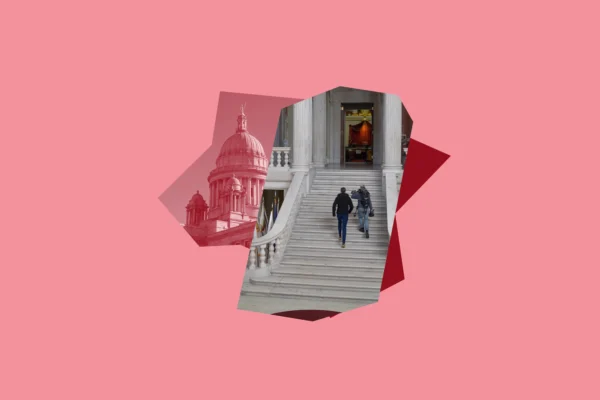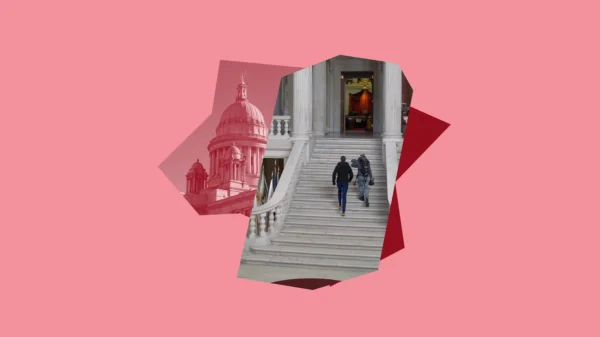In a case seeking to vindicate the right to free speech and assembly at the state’s quintessential public forum for free speech activity – the Rhode Island State House – attorneys for the ACLU of Rhode Island today filed a lawsuit against Governor Daniel McKee on behalf of activists who were intentionally denied access to the State House for a rally and threatened with arrest prior to the annual gubernatorial State of the State address in January.
On the same evening as the Governor’s speech, a “People’s State of the State” rally to raise awareness about economic disparity in Rhode Island was planned by local groups, including the Rhode Island Homeless Advocacy Project, and by Harrison Tuttle, who at the time was President of the Rhode Island Black Lives Matter PAC (which has since dissolved). The rally was supposed to take place in the State House rotunda an hour before the Governor’s State of the State address in the House of Representatives chamber. But upon arriving at the State House, Tuttle and others were advised that the Governor’s office had instructed State Police and Capitol Police to prevent them from accessing the Rotunda and the upper floors of the State House. The suit claims that the police even explicitly told Tuttle that they had instructions from the Governor’s office to bar him in particular from entering those areas. At the same time, the suit notes, other people were permitted free access to the same areas.
The rotunda is a well-known public space regularly used for protests and demonstrations, and the public areas of the State House have historically and traditionally been open to the public before and during the annual State of the State address. For this year’s address, however, entrance to the rotunda was blocked off by Capitol and State Police with a sign indicating that it was reserved from 4:30 pm to 10 pm, although records indicate that the Governor’s staff didn’t formally “reserve” the space until 4:39 PM. In any event, despite being “reserved,” the rotunda was not used for any purpose during that timeframe. The lawsuit argues that the Governor’s reservation of the space and the Capitol and State Police’s actions were undertaken to stifle the protesters’ exercise of their First Amendment rights to freedom of speech and freedom of assembly.
Unable to hold their rally in the rotunda, the protesters were instead shunted by police to the “Bell Room” for their rally, a recessed area in the back of the State House on the first floor located away from the building’s main entrance and elevators, and in a less visible and less accessible location than the rotunda.
The lawsuit, filed in U.S. District Court by ACLU of RI cooperating attorneys Lynette Labinger and Sonja Deyoe, seeks a declaratory judgment that the plaintiffs’ constitutional rights were violated; a permanent injunction prohibiting the Governor and others from restricting the right of the people to peacefully gather in the State House rotunda based on the content of their speech; and an award of damages and attorneys’ fees. To prevent a recurrence, the lawsuit will seek judicial relief before next January’s State of the State address.
The case documents can be found here.
QUOTES FROM PARTICIPANTS IN THE LAWSUIT
Eric Hirsch, executive director of RIHAP: “I’ve been advocating for an end to homelessness in Rhode Island for a long time. I was shocked to see the Rotunda at the Statehouse roped off when I arrived for the People’s State of the State rally. I had attended dozens of rallies there over the years. To make matters worse, we were also prevented from getting anywhere near the Governor’s address. We were confined to a lower floor of the Statehouse. This is unacceptable. We have a right to express our view of the Governor’s policies toward people experiencing homelessness.”
ACLU of RI cooperating attorney Sonja Deyoe: “It is incredibly important in today’s political environment that the First Amendment rights of the people to assemble, protest, and petition the government are preserved. By filing this action, our clients have decided to stand up on behalf of all Rhode Islanders to preserve those fundamental rights.”
ACLU of RI cooperating attorney Lynette Labinger: “The First Amendment prohibits our state and federal government from interfering with the public’s freedom of speech, right to assembly, and to petition the government for a redress of grievances. It is the hallmark of our most cherished civil rights—to be able to speak our own mind, to be able to persuade our elected officials or the general public, and to associate with others in an effort to advocate for, or against, change. But it is not communication if no one receives it. Government interference with the exercise of those rights is held to the most demanding standards. The last-minute creation of a non-event, which was then used as an excuse to deny local activists the ability to hold their planned rally in the State House Rotunda falls far short.”
ACLU of RI executive director Steven Brown: “Over 50 years ago, an ACLU lawsuit led to a court decision unequivocally declaring the Statehouse rotunda to be an open public forum for the expression of political speech. Since that time, the rotunda has served as the epicenter for Rhode Islanders to peacefully express their views to state leaders and the public. This lawsuit is designed to ensure that it remains that way.”


